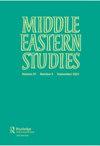“丛林别墅”核范式:以色列在不断变化的地区安全综合体中的核叙事和实践。
IF 0.4
3区 社会学
Q3 AREA STUDIES
引用次数: 0
摘要
“丛林中的别墅”这个比喻通常与以色列前国防部长埃胡德·巴拉克联系在一起,是以色列政治话语中被引用最多的隐喻之一。它的永久化促成了两种共同构成的集体身份的固定:以色列是一个在暴力和落后的阿拉伯邻国中的模范民主社会。本文探讨了这种论述的一个经常被忽视的方面:它在以色列核叙事中的转换及其对以色列核政治的影响。它认为,这种话语的延续助长了以色列的核东方主义叙事,固定了一种范式,根据这种范式,某些身份已经被明确为常识,某些行为是合法的。一方面,它帮助建立了以色列拥有核武器的权利和阿拉伯没有拥有核武器的权利。另一方面,它为以色列积极的反扩散行动提供了理由。然而,“丛林别墅”的话语及其构建的身份被固定在特定的安全背景下,以色列被视为一个面临生存威胁的孤立国家。但是,如果现状发生变化,例如新的区域安全复合体(RSC)的出现,使“丛林别墅”范式贬值,从而使以色列的核东方主义话语和实践都失去合法性,那该怎么办?随着以色列与海湾君主国的关系正常化,以及自建国以来民用核项目在该地区日益突出,以色列的政策制定者可能会发现自己陷入了一个新的困境,一个集中在重新评估诺尔最初定义的“开始主义”中的“敌国”定义,或者巴拉克定义的“丛林”。本文章由计算机程序翻译,如有差异,请以英文原文为准。
The 'villa in the jungle' nuclear paradigm: Israel's nuclear narrative and practice in a changing regional security complex.
The 'villa in the jungle' metaphor, conventionally associated with Israel's former Defence Minister Ehud Barak, is one of the most referenced metaphors in Israeli political discourse. Its perpetuation has contributed to the fixation of two co-constitutive collective identities: Israel as an exemplary democratic society amidst a violent and backward Arab neighbourhood. This article examines an often-overlooked aspect of such a discourse: its transposition within Israel's nuclear narrative and its impact on Israel's nuclear politics. It contends that the perpetuation of this discourse has fuelled Israel's nuclear orientalist narrative, fixing a paradigm according to which certain identities have crystallised as commonsensical and certain actions as legitimate. On one hand, it has helped to construct Israel's entitlement to possess nuclear weapons and the Arab non-entitlement thereto. On the other hand, it has provided a rationale for Israel's kinetic counterproliferation actions. However, the 'villa in the jungle' discourse and the identities constructed by it are anchored to a specific security context, which saw Israel as an isolated country facing an existential threat. But what if a change in the status quo, such as the emergence of a new regional security complex (RSC), devalued the 'villa in the jungle' paradigm and thus delegitimised both Israel's nuclear orientalist discourse and practice? As Israel normalises its relations with Gulf monarchies and civilian nuclear programmes become increasingly salient in the region, for the first time since its creation, Israeli policymakers might find themselves entangled in a new dilemma, one centred on a re-assessment of the definition of 'enemy state' in Naor's very first definition of the Begin Doctrine - or the 'jungle' in Barak's definition.
求助全文
通过发布文献求助,成功后即可免费获取论文全文。
去求助
来源期刊

Middle Eastern Studies
AREA STUDIES-
CiteScore
0.70
自引率
0.00%
发文量
93
期刊介绍:
Since its launch in 1964 Middle Eastern Studies has become required reading for all those with a serious concern in understanding the modern Middle East. Middle Eastern Studies provides the most up-to-date academic research on the history and politics of the Arabic-speaking countries in the Middle East and North Africa as well as on Turkey, Iran and Israel, particularly during the nineteenth and twentieth centuries.
 求助内容:
求助内容: 应助结果提醒方式:
应助结果提醒方式:


